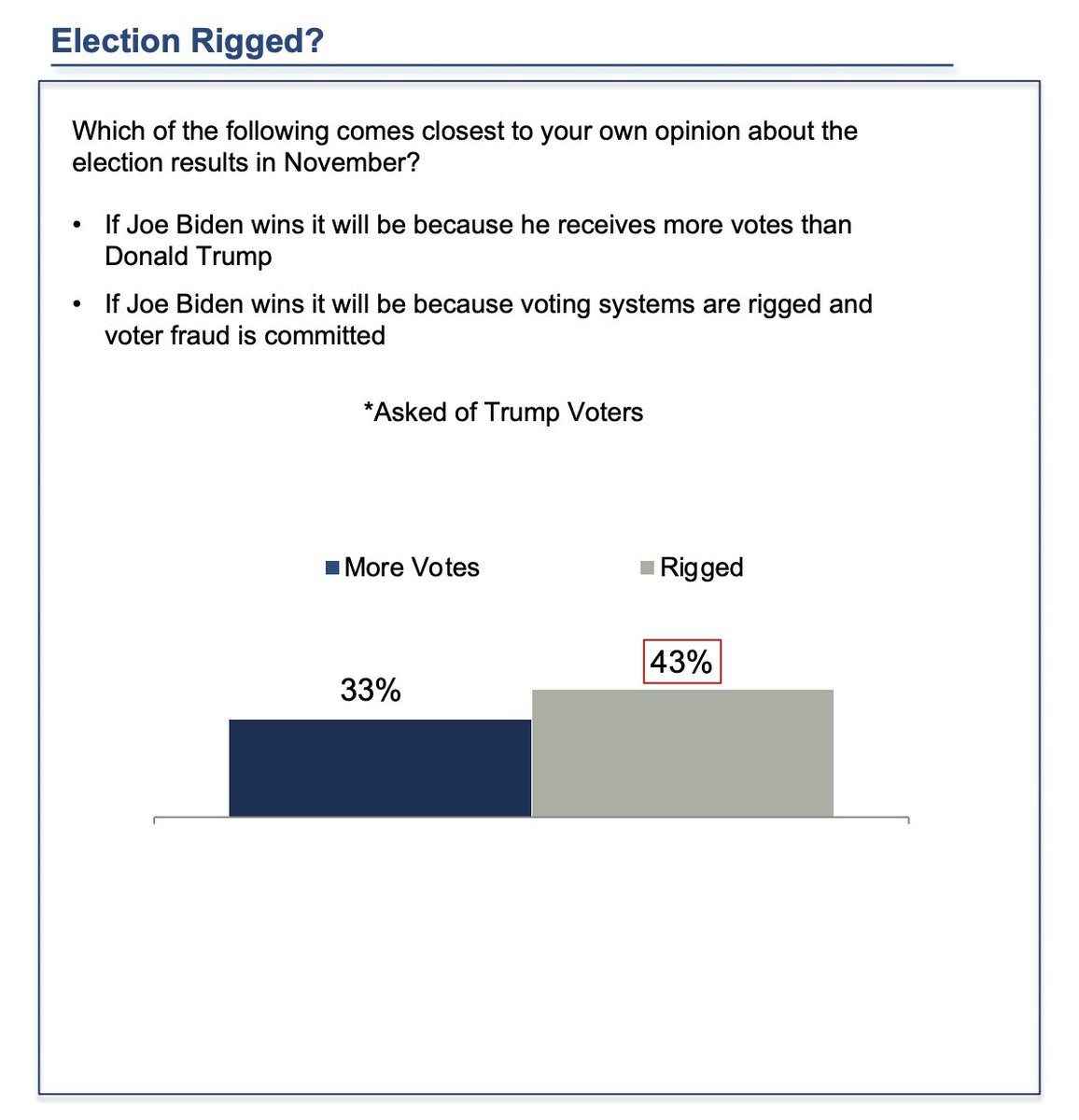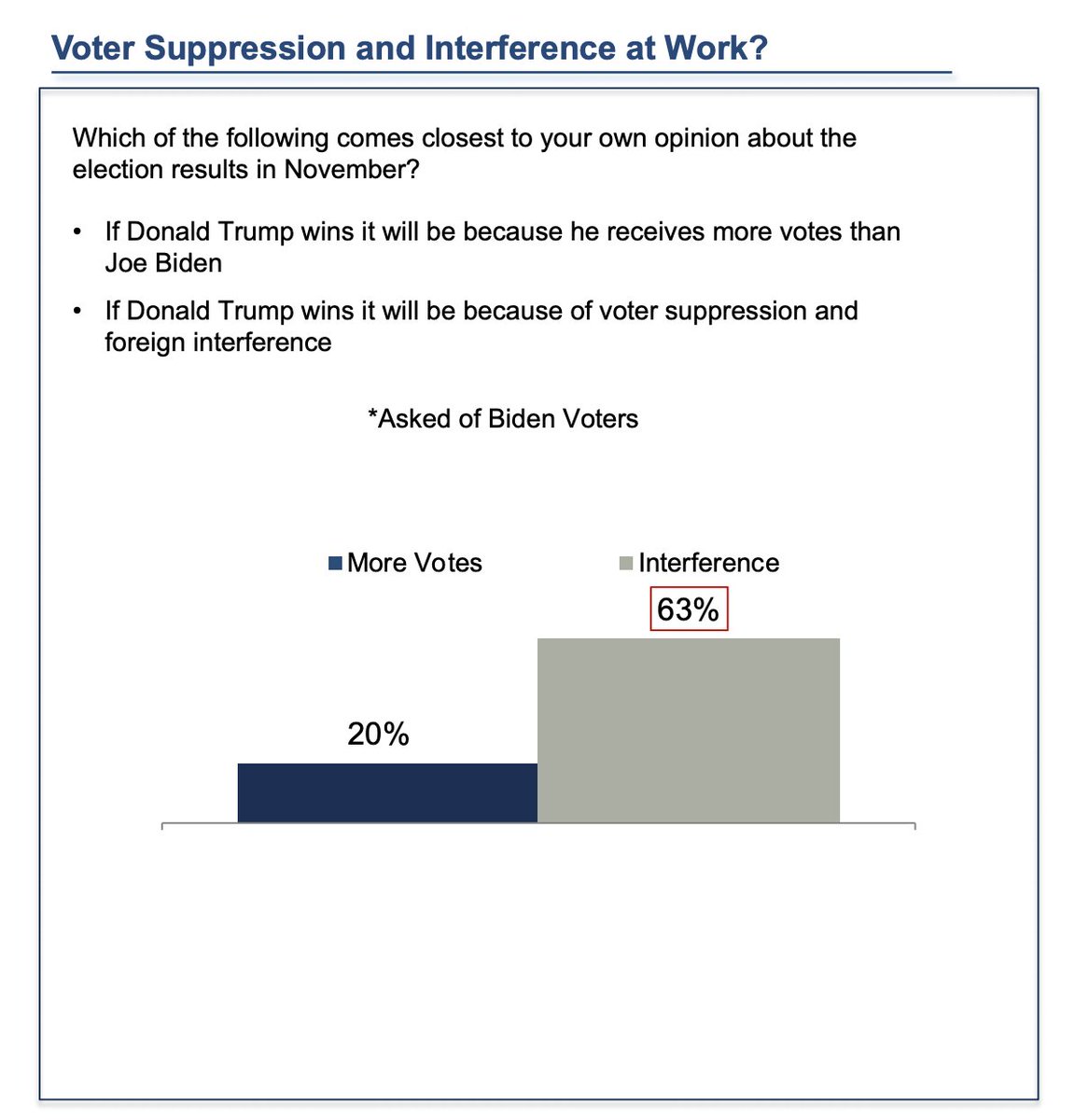Most Americans believe the upcoming election will be legitimate—unless their favorite candidate loses.
So how can we determine if a) "we were robbed" or b) the election was legitimate?
For @TheAtlantic I turn to leading scholars for an answer.
[Thread] https://www.theatlantic.com/ideas/archive/2020/09/coming-crisis-legitimacy/616340/">https://www.theatlantic.com/ideas/arc...
So how can we determine if a) "we were robbed" or b) the election was legitimate?
For @TheAtlantic I turn to leading scholars for an answer.
[Thread] https://www.theatlantic.com/ideas/archive/2020/09/coming-crisis-legitimacy/616340/">https://www.theatlantic.com/ideas/arc...
First, the bad news.
According to a new study by @campaignlegal and @protctdemocracy, most Americans are confident that the elections will be free and fair.
BUT if their own candidate loses, they are likely to say that this is because the election was rigged.
According to a new study by @campaignlegal and @protctdemocracy, most Americans are confident that the elections will be free and fair.
BUT if their own candidate loses, they are likely to say that this is because the election was rigged.
This is true for those who support Trump: a plurality of them think that, should he lose, it would be because things were rigged against him.
But it is also true for those who support Biden: an even greater number of them say that, should he lose, it& #39;s for illegitimate reasons.*
But it is also true for those who support Biden: an even greater number of them say that, should he lose, it& #39;s for illegitimate reasons.*
*As I note in the article, it& #39;d be a mistake to think of these two poll questions as exact flip sides of each other.
According to models from @NateSilver538 and others, for example, because of the electoral college Biden is in fact more likely to lose despite getting more votes.
According to models from @NateSilver538 and others, for example, because of the electoral college Biden is in fact more likely to lose despite getting more votes.
This raises a deep dilemma:
* There are serious threats to the integrity of the upcoming election. We must not be naive about them.
* But democracy only works if elections are the arbiter of who gets to govern. So falsely refusing to accept its outcome would do terrible damage.
* There are serious threats to the integrity of the upcoming election. We must not be naive about them.
* But democracy only works if elections are the arbiter of who gets to govern. So falsely refusing to accept its outcome would do terrible damage.
Since there are many ways of undermining an election, there is no simple check-list that can tell us whether it was legitimate.
But in conversations with @dziblatt, @davidashimer, @jessmarsden and @thetrevorpotter, I did discover four rules of thumb we should all bear in mind.
But in conversations with @dziblatt, @davidashimer, @jessmarsden and @thetrevorpotter, I did discover four rules of thumb we should all bear in mind.
1) Politicians will try to sow confusion. Ignore them.
As Trevor Potter told me, Donald Trump "is likely to argue that absentee ballots are fraudulent and that the election is being stolen.”
Don& #39;t fall for it if and when politicians make these kinds of claims without evidence.
As Trevor Potter told me, Donald Trump "is likely to argue that absentee ballots are fraudulent and that the election is being stolen.”
Don& #39;t fall for it if and when politicians make these kinds of claims without evidence.
2) Distinguish between ordinary forms of malfunction and an extraordinary attack
Our election system is bad. And that& #39;s deeply unjust.
But that& #39;s different from an extraordinary attack like the government telling voters in cities to stay at home or voting machines being hacked.
Our election system is bad. And that& #39;s deeply unjust.
But that& #39;s different from an extraordinary attack like the government telling voters in cities to stay at home or voting machines being hacked.
3) Rely on data and impartial umpires, not anecdotes and partisans
As Dan Ziblatt told me: “You’re likely to hear about something suspicious going on in some place. Pay attention but don’t be swayed. If something bad is really going on, we will get reliable data to prove it."
As Dan Ziblatt told me: “You’re likely to hear about something suspicious going on in some place. Pay attention but don’t be swayed. If something bad is really going on, we will get reliable data to prove it."
4) Look at the totality of the evidence
There will be *some* suspicious things going on. But if the election is really being rigged, the overall pictures should be pretty clear:
"When an election is blatantly rigged,” he said, “that is identifiable," David Schimer told me.
There will be *some* suspicious things going on. But if the election is really being rigged, the overall pictures should be pretty clear:
"When an election is blatantly rigged,” he said, “that is identifiable," David Schimer told me.
No matter who wins the election, millions of Americans are likely to doubt that its outcome is fair. American democracy could soon face one of the biggest tests to its legitimacy in living memory.
But there is no need to despair. We are not yet Turkey or Hungary.
But there is no need to despair. We are not yet Turkey or Hungary.
As Jess Marsden told me, “the instinct of the American people should be to trust in the outcome of our election. When you look at the details of how elections are run—from security features to transparency measures to legal guardrails—the list of fail-safes is quite long.”
[End]
[End]

 Read on Twitter
Read on Twitter



